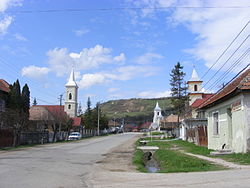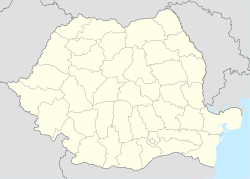Chinteni
| Chinteni | |
|---|---|
| Commune | |
 |
|
 Location in Cluj County |
|
| Location on Romania map | |
| Coordinates: 46°51′40″N 23°32′20″E / 46.86111°N 23.53889°ECoordinates: 46°51′40″N 23°32′20″E / 46.86111°N 23.53889°E | |
| Country |
|
| County | Cluj County |
| Status | Commune |
| Settled | 1263 |
| Commune seat | Chinteni |
| Villages | Chinteni, Deușu, Feiurdeni, Măcicașu, Pădureni, Săliștea Veche, Sânmărtin, Vechea |
| Government | |
| • Mayor | Magdalena Lucia Suciu (PSD) |
| Area | |
| • Total | 98 km2 (38 sq mi) |
| Population (July 1, 2007) | |
| • Total | 2,744 |
| • Density | 28/km2 (73/sq mi) |
| Time zone | EET (UTC+2) |
| • Summer (DST) | EEST (UTC+3) |
| Area code(s) | +40 x64 |
| Website | http://www.primariachinteni.ro/ |
Chinteni (Hungarian: Kajántó; German: Kallentau) is a commune in Cluj County, Romania. It is composed of nine villages: Chinteni, Deușu (Diós), Feiurdeni (Fejérd), Măcicașu (Magyarmacskás), Pădureni (Fejérdi fogadók), Săliștea Veche (Szellőcskevölgy), Sânmărtin (Szentmártonmacskás), Satu Lung (Hosszúmacskás) and Vechea (Bodonkút).
According to the 2011 census, Romanians made up 80.7% of the population, Hungarians made up 18.5% and Roma made up 0.5%.
Vechea is a village in Chinteni commune, with a population of 2075 people (2002). The village population is mostly Romanian, along with a few Hungarian families.
Vechea has a long attested history of more than 2000 years. Under the direction of professor Vasile Suciu, a small museum was set up at the local school, with artifacts discovered in the area. These artifacts attest the long history of human life in that part of the world.
There are 3 churches in Vechea, two Orthodox and one Calvinist. One of the Orthodox church was built in 1726, a marvel of wood architecture, conserving most of its original structure.
Vechea is divided from Deuşu village only by the national road from Cluj-Napoca to Vultureni-Borşa.
Feiuredni has a long history as well. Until the 1980s it had a high population, but the growing industry in the nearby Cluj-Napoca combined with a difficult commute resulted in a massive migration of the young families to the city. At one point the regular bus between the village and the city was cut off. Nowadays it's a reverse phenomenon people are moving back in the village. The causes are thin time the low price of houses and the high cost of living in the city for the lower income families.
Feiurdeni has a Roma (Gypsy) community concentrated in the Buna quarter of the village. Numerous back in time they moved in the city in the last decade of the communist regime, now are moving back in the village where life is no so expensive as in the city.
...
Wikipedia

